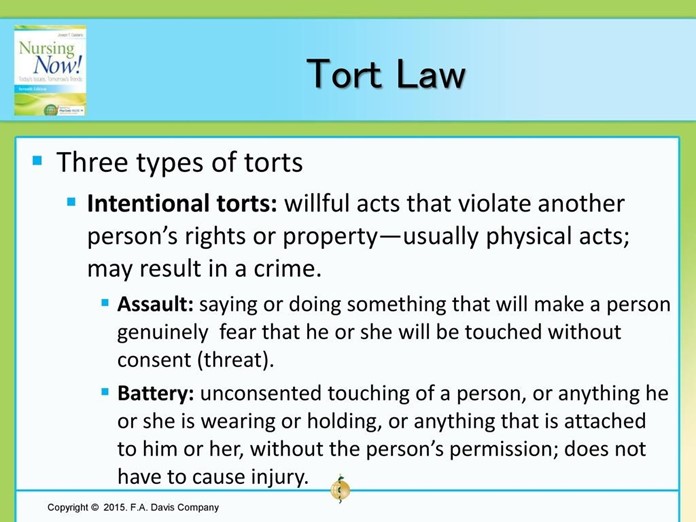Which situation can lead to a tort against a nurse? SELECT ALL THAT APPLY:
A stranger asks for details regarding a patient, and the nurse refers him to the patient or his family.
A patient refuses a blood transfusion on religious grounds.
In a staff meeting, a nurse repeats a rumor about a patient's personal life.
A nurse tells friends something unusual about a patient that she noted in the patient's chart.
A patient refuses medication, but the nurse forces her to take it for her own good.
Correct Answer : C,D,F
Situations that can lead to a tort against a nurse include repeating a rumor about a patient's personal life in a staff meeting, telling friends something unusual about a patient that was noted in the patient's chart, and forcing a patient to take medication against their will. These actions can result in legal action against the nurse for invasion of privacy or battery.
Option A is incorrect because referring a stranger to the patient or their family for details regarding the patient is an appropriate action.
Option B is incorrect because respecting a patient's right to refuse treatment on religious grounds is an appropriate action.
Option E is incorrect because placing an alarm on the bed of a patient prone to falling is an appropriate action to ensure their safety.

Nursing Test Bank
Naxlex Comprehensive Predictor Exams
Related Questions
Correct Answer is B
Explanation
A nurse's best protection against negligence or malpractice is to follow the standards of practice. These standards define the acceptable level of care that a nurse is expected to provide and are based on current evidence and professional consensus. By adhering to these standards, a nurse can demonstrate that they have provided care that meets the expected level of quality and safety.
The other options are not the best protection against negligence or malpractice. Asking permission from the managing nurse prior to performing any duties [a] may be helpful in some situations, but it is not a guarantee against negligence or malpractice. Never being alone with a patient [c] is not practical or necessary for providing safe and effective care. Recording patient interactions with your phone [d] may violate patient privacy and is not an effective way to prevent negligence or malpractice.
Correct Answer is C
Explanation
In this situation, the nurse's failure to administer Mr. Smith's medication on time as ordered, resulting in harm to the patient, could be considered malpractice. Malpractice refers to a failure to meet the standard of care that results in harm to a patient.
Option A refers to legal responsibility for one's actions, but it does not specify the type of wrongdoing.
Option B refers to wrongdoing or misconduct, but it is not specific to the medical profession.
Option D refers to a failure to fulfill one's duties or obligations, but it does not necessarily imply harm to a patient.
Whether you are a student looking to ace your exams or a practicing nurse seeking to enhance your expertise , our nursing education contents will empower you with the confidence and competence to make a difference in the lives of patients and become a respected leader in the healthcare field.
Visit Naxlex, invest in your future and unlock endless possibilities with our unparalleled nursing education contents today
Report Wrong Answer on the Current Question
Do you disagree with the answer? If yes, what is your expected answer? Explain.
Kindly be descriptive with the issue you are facing.
